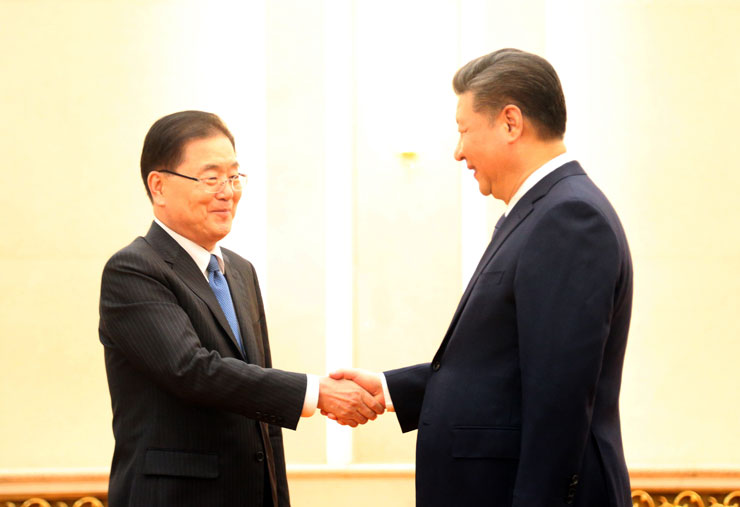South Korea is seeking cooperation from neighboring states in its bid to pave the way for the summit between North Korean leader Kim Jong-un and U.S. President Donald Trump by May.
South Korean envoys who met with Kim and Trump last week are visiting heads of state in China and Japan to share details of the meetings.
After returning from Washington, National Security Council Chief Chung Eui-yong headed to Beijing on Monday and National Intelligence Service director Suh Hoon headed to Tokyo, after reporting details of their meeting with Trump to South Korean President Moon Jae-in.
Chung met with Chinese President Xi Jinping in Beijing, Monday.
Xi told Chung China supports Washington-Pyongyang dialogue, and wants to develop relations with South Korea “stably and healthily,” according to Cheong WaDae.
In a message delivered through Chung, Moon invited Xi to visit Seoul at an early date.
Chung will head to Moscow on Tuesday. It is unclear whether he will be able to meet with Russian President Vladimir Putin, due to the upcoming presidential election on Sunday, in which Putin is running.
Beijing and Moscow have welcomed Pyongyang’s shift in stance. The two states also pledged to play a facilitating role in the inter-Korean summit.
Meanwhile, Suh will meet with Japanese Prime Minister Shinzo Abe on Tuesday. He spoke with Foreign Minister Taro Kono after arriving in Tokyo a day earlier.
Moon is also reportedly considering holding telephone conversations with heads of state of the U.S., China, Japan and Russia.
“An invaluable opportunity to open a road to the denuclearization of the Korean Peninsula, lasting peace and co-prosperity has come forth,” Moon said in a meeting with secretaries, Monday.
“There will be critical changes as summits between North and South Korea and the U.S. will take place in the next two months. But because what we aim to achieve, in the short time span of two months, is something the world has not succeeded in up until now, it is difficult to be optimistic about the results and we are taking caution in the process.”
THE KOREA TIMES
R.S

